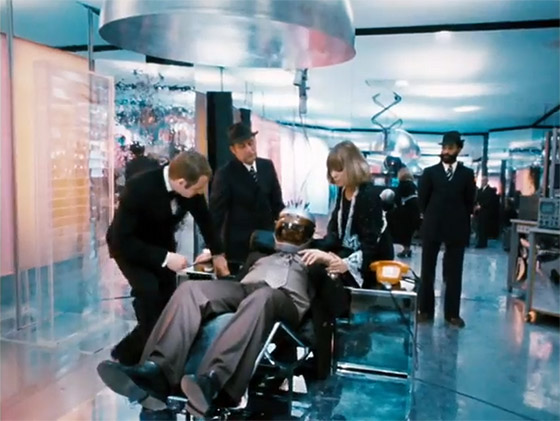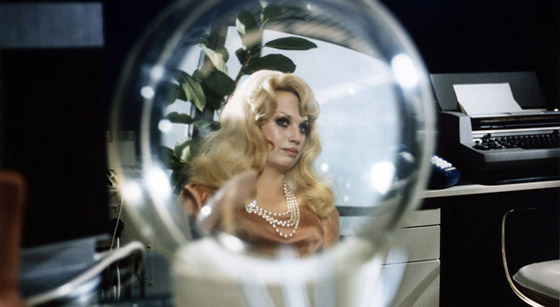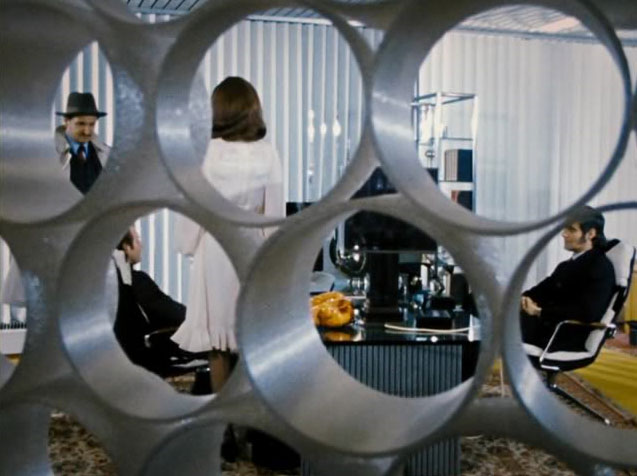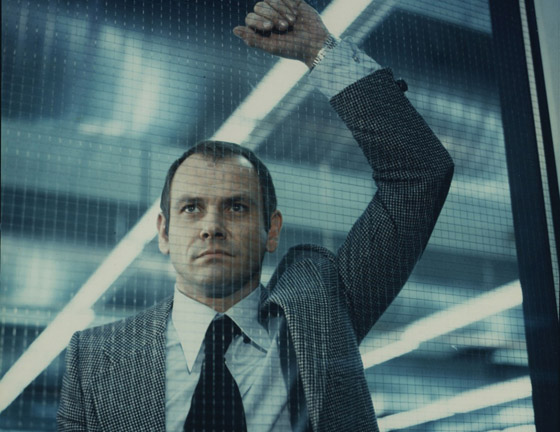
Rainer Werner Fassbinder directed World on a Wire as a two-part, four-hour science fiction program for German television in 1973. The subject matter was not typical Fassbinder: based upon the 1964 novel Simulacron-3 by Daniel F. Galouye (also the basis for 1999’s The Thirteenth Floor), it posits a future where users of a computer program can be projected into a virtual environment as simulacra, completely unaware that they and their world are false. The concept was new to science fiction novels in the late 50’s and 60’s, and groundbreaking authors like Galouye and Philip K. Dick essentially predicted the virtual, reality-teasing environments with which we interact today, although the technology has not yet evolved to the point where we need to begin questioning whether or not we’re just avatars trapped within Second Life. But while Dick struggled through the 70’s for recognition, and had his hopes for a film adaptation of one of his novels repeatedly dashed until Blade Runner (1982) finally came along (the same year he died), World on a Wire plays like the 70’s low-budget PKD adaptation that never was. It could almost be the cryptic science fiction film described in VALIS (1981) which helps its protagonist decode the cosmos around him. If such a thing were to exist, it would be fitting if it were World on a Wire: hitherto one of the most obscure and difficult-to-see films from one of the major directors of the New German Cinema, an avant-garde, genuinely nutty high-concept satire that picks up where Godard’s Alphaville (1965) left off.

Barbara Valentin as the mysterious secretary Gloria Fromm.
Appropriately, Alphaville‘s Eddie Constantine has a cameo in World on a Wire, though it serves no essential plot purpose – just one more bizarre moment in a film that’s glutted with them. Klaus Löwitsch (The Odessa File) plays Fred Stiller, who works for the company which has developed the virtual world, where “identity units” are placed like chess pieces by the controllers, sitting in booths with giant helmets covering their heads. The purpose of the program is to mimic reality in all its minutiae, so future events in the “real” world can be accurately predicted using the simulation. For a long while we don’t actually see the inside of the program – which is referred to as “below,” this world being “above.” Instead, we’re entangled in a Surrealist’s mystery: Stiller is investigating the mysterious death of the creator of the program, Professor Vollman, and trying to determine the fate of another employee, Günther Lause, who actually vanishes into thin air while Stiller is holding a conversation with him. Just as strangely, it’s not long before Stiller is the only one who remembers that Günther Lause even existed. His investigations take him to burlesque clubs where Marlene Dietrich lookalikes are singing torch songs and bodybuilders dance with topless women; through white-walled offices where corporate players hatch murky conspiracies for control of the company; into apartments and bedrooms; and “below,” into the simulation itself, where Stiller meets an identity unit named Einstein which is plotting escape from the prison of its reality.

Fassbinder's restless camera, framing a drawing-room mystery set in corporate boardrooms.
Part One introduces us to a large cast of characters, and, like Stiller, we don’t know who to trust: to name just a few, there’s the professor’s daughter, Eva (Mascha Rabben), with whom Stiller is in love; a smirking executive for the company named Siskins (Karl Heinz Vosgerau, The Lost Honor of Katharina Blum); Stiller’s kind, voluptuous, but vacant-eyed secretary, Gloria Fromm (Barbara Valentin, Ali: Fear Eats the Soul); and an investigative journalist, Rupp (horror director Ulli Lommel), who suspects that Stiller might be mad. But by the end of Part One, our hero comes to the conclusion that we guessed long ago: the world he thinks is real is just another simulation. Which would certainly help explain World on a Wire‘s utter strangeness, from its improbably hard-boiled dialogue to its dramatically random events: such as the moment a pallet of cinder blocks is dumped suddenly on a woman’s head, and Stiller merely borrows a match from the corpse to light another cigarette. When Einstein defies the software and leaps from “below” to “above” to deliver Stiller the message that this reality is just another false layer, Stiller suffers an electronic-music-induced migraine. (The score, by Gottfried Hüngsberg, is electronic a la Forbidden Planet, with occasional snatches of songs and surf music.) Part Two is less Godard and more authentic Fassbinder: now Stiller knows his reality is false and that he might be no more than an artificial construct, but he’s stuck here. It’s the familiar Fassbinder existential crisis. While he tries vainly to find the contact sent from the world “above,” his colleagues think he’s gone insane; continuing the parodic film noir vein, soon Stiller is falsely accused of murder and on the run (“I’m the man who knows too much!” he explicitly laments). But he runs half-heartedly. If all of reality is false, why should he participate in it? He stumbles lethargically away from the corporate thugs sent to grab him and mobs of German cityfolk who chant “murderer”; he tries to find seclusion, longing for his love Eva, and seemingly prepared to drink himself to death. Yes, this is how Fassbinder does science fiction – not too far removed from his other work, such as The Merchant of Four Seasons (1971).

Klaus Löwitsch as Fred Stiller
But there is a playfulness, and a sense of humor, which relieves the misery and despair. Those with a casual interest in Fassbinder will find World on a Wire an interesting but flawed work that foreshadows David Cronenberg’s PKD homage eXistenZ (1999) and, of course, The Matrix (1999). Fassbinder enthusiasts may find the film a revelation; and indeed some consider it their favorite of his brief but deep filmography. But it’s a sloppy work at times, filmed quickly (he made three other films in 1973), with a protracted story that’s often plodding. His trademark lack of rehearsal is evident: in one tracking shot, which swoops completely around a log cabin in a forest, Fassbinder doesn’t seem to account for the sun, so that the camera’s shadow is cast upon the wall. It’s like a failed attempt at Antonioni. But the hurried approach lends an interesting facet to Klaus Löwitsch’s lead performance: though he was reportedly drunk through much of the shooting, it’s not inappropriate for a character reacting to reality crumbling around him. In one scene he abruptly bumps into one of the actors in what appears to be an accident, but they carry on; I would have kept the take too. Out of circulation for years, World on a Wire was recently restored and premiered at the 2010 Berlin Film Festival in its full, two-part, 212-minute glory. After making the revival circuit, it’s headed for Blu-Ray and DVD via the Criterion Collection this coming February. This work of genuine schizophrenia will find an appreciative audience weaned on Twin Peaks, A Scanner Darkly, and Alphaville. I confess I don’t love it, but I’m glad it exists.









